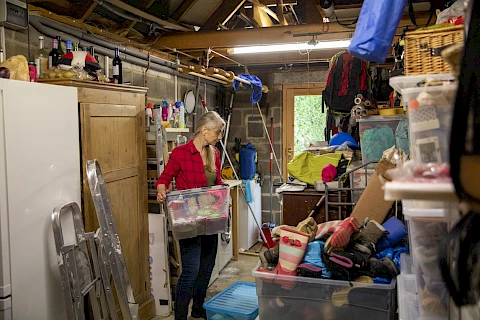
Hoarding is a serious issue that affects many seniors. It involves excessively collecting items and being unable to discard them. This can lead to overcrowded living spaces filled with clutter. Addressing hoarding is important for the health and safety of seniors. Senior Helpers of Nature Coast will outline what hoarding entails and how it can be curtailed.
Increased Risk of Falls and Fire Hazards
Clutter can make it hard to move around the house. Items left on the floor or stacked up can easily trip someone. Falls are a major concern for seniors. According to the CDC, one out of four seniors falls each year, and falls are the leading cause of injury deaths among seniors.
Excessive clutter can also create significant fire hazards. Items piled up can catch fire more easily and make it harder to escape in an emergency. Firefighters may also have a tough time navigating through overcrowded areas. To reduce fire risks, keep walkways clear, avoid storing items on stoves or heaters, and install smoke detectors in every room. By taking these steps, seniors can create a safer living environment.
Unsanitary Living Conditions and Isolation
Hoarding can lead to dirty and unsanitary conditions. Accumulated items can attract pests like mice or bugs, making it hard to clean and maintain a hygienic home. Unsanitary conditions can cause health issues, such as respiratory problems or infections. Signs that a home may be unsanitary include unpleasant odors, visible mold or mildew, and pest infestations. Addressing these issues is key to maintaining a safe and healthy living space.
Hoarding often leads to social withdrawal. Seniors may feel embarrassed about their living conditions and avoid inviting friends or family over. This isolation can have emotional and psychological effects. Loneliness can lead to depression and anxiety, making it even harder to manage hoarding behaviors. It is important to maintain social interactions, such as joining local senior groups, participating in community activities, and keeping in touch with family and friends. Staying connected can improve mental well-being and reduce feelings of isolation.
Mental Health Implications and Support
Hoarding is often linked to mental health issues. Common conditions associated with hoarding include anxiety, depression, and obsessive-compulsive disorder (OCD). Hoarding can worsen these conditions, creating a cycle that's hard to break. Mental health professionals can provide therapy and strategies to manage hoarding behaviors.
Many resources are available for seniors. Local organizations can offer support and guidance. National resources include the National Alliance on Mental Illness (NAMI) and the Hoarding Cleanup Support Hotline.
Talking to a loved one about hoarding can be tough. Start by expressing concern and offering help. Suggest small steps, like clearing one room at a time, to make the process more manageable.
Struggling With Hoarding? Let Us Help
Hoarding poses serious dangers for seniors, from falls and fires to unsanitary conditions and social isolation. Addressing hoarding behaviors and seeking support can greatly improve the quality of life for seniors. If you or a loved one in the Nature Coast area is struggling with hoarding, Senior Helpers of Nature Coast is here to help. Contact us today for custom senior care and support in and around Hernando/Citrus, Spring Hill, Brooksville, and Weeki Wachee.